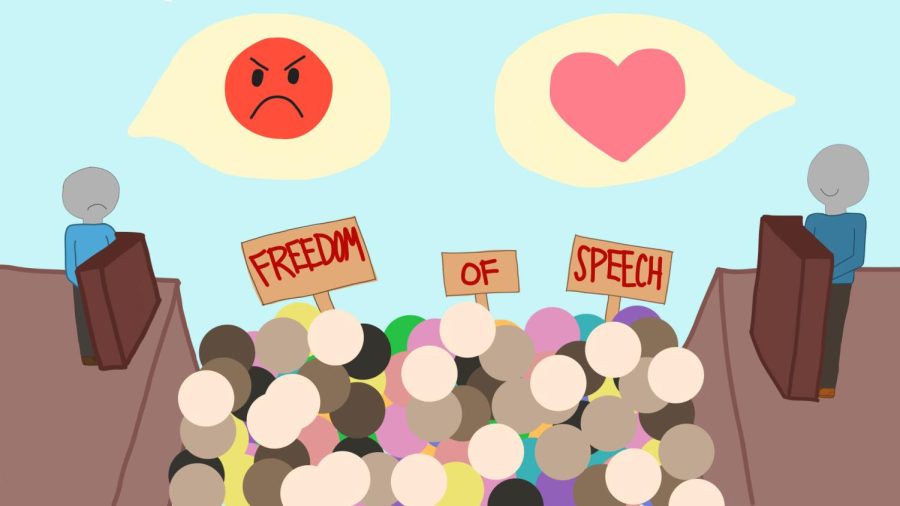Limitations are necessary for freedom of speech
Staff writer Verina Hanna reminds that the freedom of speech is not an excuse for harmful language and words.
March 17, 2022
More than once in a classroom, I’ve seen students picking on someone who didn’t even bother them. When someone tells them what they’re doing is rude, they generally reply saying, “I can say whatever I want. The freedom of speech protects me!”
Is that right? Can people say whatever they want? Yes, freedom of speech gives people the right to say what they think, but what if what they say hurts millions of people or even just one person? Then is freedom of speech still protecting people?
The First Amendment in the Bill of Rights reads, “Congress shall make no law respecting an establishment of religion, or prohibiting the free exercise thereof; or abridging the freedom of speech, or of the press; or the right of the people peaceably to assemble, and to petition the government for a redress of grievances.” This amendment does not mean people have the right to harm one another with their speech; it actually means the government can not jail, fine or impose civil liability on people or organizations based on what they say or write. Therefore, yes, the government can’t stop you, but that doesn’t mean that you can go out and say whatever you want and not get consequences.
Many people believe that freedom of speech is exactly how it sounds—that it gives them the right to say anything they want, anytime they want—but this is not the reality. There are limitations to this freedom.
The limitations of the freedom of speech are based on time, place and manner, regardless of the point of view. They are restrictions that balance other rights. For example, speech that significantly disrupts the school environment or infringes on the rights of others may be prohibited by schools. Many courts have ruled that school officials have the authority to limit obscene student speech.
There have been many court cases that have determined how far the freedom of speech should go. According to The First Amendment Encyclopedia, the Supreme Court determined in Tinker v. Des Moines Independent Community School District (1969) that public school officials cannot limit student expression unless they can reasonably predict that it will severely disrupt school activities or infringe on others’ rights. However, in Bethel School District No. 403 v. Fraser (1986), the Supreme Court held that when a student was reprimanded for making a lewd and vulgar speech at a school assembly, school officials did not violate his free expression and due process rights. So this shows that, yes, people do have the freedom of speech but there is a limit that cannot be passed when the speech is offensive or demonstrably harmful to others.
People can’t go around saying what they think all the time when that speech infringes on others’ rights. There needs to be a limit for what people do say, where people say it, when people say it and even, in some cases, what it is about.
People might say that the First Amendment doesn’t take sides. Some people claim that making restrictions for putting limitations on the freedom of speech will only make the freedom of speech seem biased or unfair. However, I believe that even though we do have freedom of speech in the United States, people should recognize and respect this right’s limitations. Just because a person has the right to speak does not mean they have the right to use that power to hurt others.
Words are very powerful. What we say can affect people, change people, hurt people, encourage people and give hope. There is nothing wrong with supporting people or making someone’s day.












Andy • Nov 16, 2024 at 9:54 pm
The fact that comments have to be approved by the publisher is just proof again that you don’t value free speech. You have the ability to quash any dissenting opinions.
Andy • Nov 16, 2024 at 9:51 pm
It is a slippery slope to regulate speech. Who defines hate? What is happening in the UK is a perfect example of why you are wrong. Going to prison for a Facebook post? Seriously? People need to learn there is no right to not be offended. People need to grow a pair and move on.
Lord Fart Quad • Oct 8, 2024 at 2:10 pm
what the sigma
Jay • Jan 24, 2024 at 2:04 pm
very much goodie read
Dingle cringle berry • Jan 16, 2024 at 6:08 pm
I like 👍🏿
kai • Jan 16, 2024 at 4:40 pm
This cool
pablo martinez • Dec 8, 2023 at 9:38 am
nah man this ain´t it
trad • Jan 30, 2023 at 6:05 pm
ong or ong
yay • Mar 10, 2023 at 12:06 pm
ong
John Kadis • Jan 2, 2023 at 10:21 pm
I agree. Indeed this is the best article.
shahraib • Oct 6, 2022 at 5:10 am
Best article…
I found it very informative..
Thankyou.
liberty • Nov 9, 2022 at 1:16 pm
same